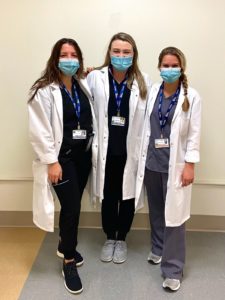Treating vent patients requires a speech-language pathologist with a unique skill set.
While a patient is on a ventilator, their ability to speak becomes either significantly altered or eliminated completely. In most cases, the air that is needed to power the voice never reaches the vocal folds in order to produce sound. The role of the Speech-Language Pathologist in treating vent patients is to help them to communicate & consume a safe diet.
This can be accomplished by:
-
Developing an alternative means of communication via an augmentative and alternative device (either high- or low-tech options are available).
-
Working in conjunction with the multidisciplinary team to identify candidates and guide the placement of a speaking valve. This allows the air to pass through the upper airway to fuel the voice.
-
Instructing the patient on the proper use of the speaking valve and develop a restorative program to rehabilitate and increase the patient’s ability to communicate verbally.
-
When properly trained, it is in our scope of practice to suction.
-
Working in collaboration with respiratory clinicians and the Interdisciplinary Team to develop respiratory strategies. Speech & Respiratory work together to facilitate ventilator weaning and decannulation.
Further, patients with tracheostomy and mechanical ventilation will most often experience a change in swallow function. A knowledgeable nursing home speech-language pathologist helps guide these patients back to an oral diet by:
-
Aid in the process of weaning from the ventilator.
-
Place a speaking valve which, in addition to being used for speech, restores the intrinsic closed pressure system for swallowing and allows for heightened sensation and smell.
-
Assess the patient’s ability to tolerate food and liquid given their current respiratory and medical status; some patients can tolerate an oral diet despite their dependence on mechanical ventilation.
-
Develop a patient-specific restorative program including compensatory strategies to decrease the risk of aspiration. Additionally, improving the function of the swallow, restorative exercises, and diet modification are critical.
-
Provide education to the patient, their families/caregivers, and staff.
About the Author: Originally from Port Jefferson, New York, Jennifer Baquet Maher, MA, CCC-SLP is the Regional Manager for Language Fundamentals in Long Island, NY. She holds a Master’s Degree from St. John’s University’s Communication Sciences and Disorders program. In her spare time, Jen enjoys cooking, traveling & spending time with family.



